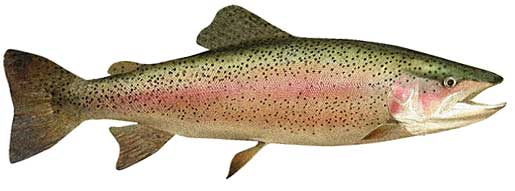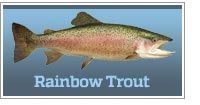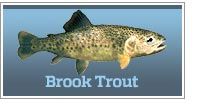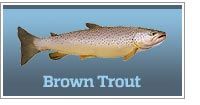Trout Fishing In Georgia
Guide to catching rainbow, brook and brown trout in area lakes
Last updated on .
Best Trout Species, Lakes, Lures & Bait
Fishing For Rainbow Trout
Rainbow trout are one of the most fished for trout species in the state, and can be found in numerous Georgia lakes and rivers. Known for its tasty pink flesh, rainbows are a favorite among the vast majority of trout anglers in the state. It also appeals to the fly fisherman as it can be caught on flies as well as other small baits and lures. It feeds on small insects, minnows, crustaceans and worms. It is ideal for both sport and dining pleasure. Some popular trout fishing destinations in Georgia include the Chattahoochee River, Toccoa River, and Smith Creek. More...
Fishing For Brook Trout
Brook trout, with their stunning colors and willingness to bite, can be found in remote mountain streams and creeks across the state. These small but feisty fish can provide an exciting fishing experience for those willing to explore Georgia's more secluded and scenic locations. The primary food source of brookies is small insects, mollusks, crustaceans and other small fishes. In lakes where brook trout are stocked, shade over shallow cover is a great place to start. Areas such as the Chattahoochee National Forest provide excellent opportunities to catch brook trout in a pristine and scenic setting. More...
Fishing For Brown Trout
Brown trout, another prized trout species, can be found in select Georgia lakes and rivers. Many of these fisheries are attracting anglers from near and far. These elusive and wary fish offer a challenge to anglers, requiring stealthy presentations and precise casting to entice a bite. Brown trout feed on worms, minnows, insects and crustaceans. Larger browns can be taken on jerkbaits, small crankbaits and spinners. The Soque River and the Toccoa River are renowned for their brown trout populations. More...
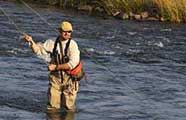 Georgia offers nice opportunities for trout fishing, with both native and stocked trout species found in various lakes and rivers across the state. The purpose of this page is to share basic information about trout fishing and identify trout fishing waters in the state. The three primary trout species targeted by anglers in Georgia are rainbow trout, brown trout, and brook trout.
Georgia offers nice opportunities for trout fishing, with both native and stocked trout species found in various lakes and rivers across the state. The purpose of this page is to share basic information about trout fishing and identify trout fishing waters in the state. The three primary trout species targeted by anglers in Georgia are rainbow trout, brown trout, and brook trout.
When targeting trout in Georgia, anglers use various techniques such as fly fishing, spin fishing, and bait fishing. Popular fly patterns include nymphs, streamers, and dry flies that imitate the trout's natural prey. Additionally, live bait and artificial lures can be effective in enticing trout to bite.
Trout Fishing Lakes
Blue Ridge Lake, Carters Lake, Lake Burton, Lake Lanier, Lake Nottely and Lake Russell are the primary lakes with populations of trout.
Trout Species In The State
Rainbow trout
World record: 42 lbs 2 oz
State Record: 17 lbs 8 oz
Brook trout
World record: 14 lbs 8 oz
State Record: 5 lbs 10 oz
Brown trout
World record: 40 lbs 4 oz
State Record: 20 lbs 14 oz
Click the images and links above for species details.
Select the best trout lures and baits
Trout spinners, crankbaits and jerkbaits work well for shallow, reasonably active fish. Salmon eggs, worms and prepared baits will work at virtually all depths.
State Trout Records
The state record rainbow trout was caught from the Soque River.
The state record brook trout was taken out of Waters Creek.
The state record brown trout came from the Chattahoochee River.
Georgia Trout Information
Visit the Georgia Department of Natural Resources for details regarding trout stocking in Georgia. Watch trout fishing videos to see trout anglers in action.
Additional trout information
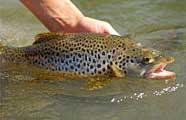 The 5 primary trout species are rainbow, brook, brown, cutthroat and lake trout. Browns are considered the most difficult to catch and brookies are the easiest. Pure cold water is key to survival of the trouts.
The 5 primary trout species are rainbow, brook, brown, cutthroat and lake trout. Browns are considered the most difficult to catch and brookies are the easiest. Pure cold water is key to survival of the trouts.
Watch trout fishing videos to see trout anglers in action.
Trout locations and info, by state
012226
GEORGIA




